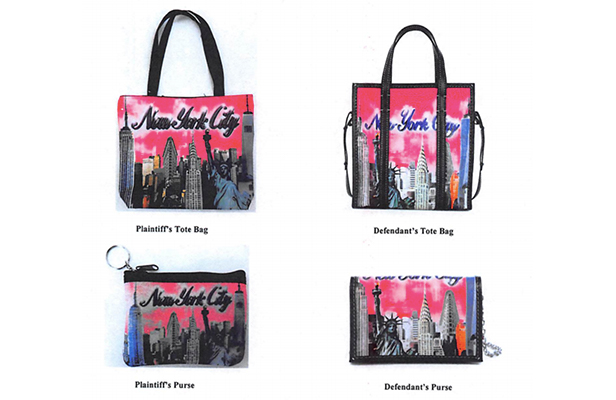December 12, 2018
Fashion House Balenciaga Reaches Copyright Infringement Settlement
Two parties have reached a settlement in a case focused on fashion copyrights.
This past summer, Brooklyn, NY-based City Merchandise, Inc. accused Balenciaga of stealing the design for its New York City souvenir bags for its Resort 2018 collection, which debuted in November 2017. City Merchandise said that Balenciaga “willfully, intentionally, and purposefully” took the styles, and sold a “virtually indistinguishable” version of its bags for $2,000. The Brooklyn company proceeded with legal action against the fashion house.

Image from the official complaint filing.
In the official complaint, City Merchandise claimed that Balenciaga creative director Demna Gvasalia “has been repeatedly publicly scorned in fashion magazines and by online fashion observers for its [sic] willingness to copy the work of others.” The complaint mentioned an interview Gvasalia gave to People magazine in December 2017, in which he said, in part, “every garment I do is based on a garment that already exists; I don’t invent anything new.”
Alyssa Vingan, editor-in-chief of Fashionista.com, noted the similarities in a tweet from February 2018, and was named in the official suit as evidence that the alleged infringement has been noticed by members of the public.
Left: A souvenir NYC tote bag in the JFK airport gift shop. Right: The Balenciaga version that’s retailing for $1950 right now. Demna, you sly dog! pic.twitter.com/dWG2Q3R3pP
— Alyssa Vingan Klein (@alyssavingan) February 25, 2018
In recent months, Balenciaga has been called out for copying the iconic blue IKEA in-store shopping totes and the Ruff Ryders record label logo, which City Merchandise cited in the complaint. Balenciaga is also currently involved in a lawsuit with CAR-FRESHENER Corporation, maker of the iconic tree-shaped air fresheners, for allegedly stealing the copyrighted tree design and creating keychains being sold for $275 each.
Last month, Balenciaga responded to City Merchandise, stating that the souvenir company had no basis on which to sue the company since they had no official copyright protection for the bag style. Its claim that the copyright had been infringed upon “is barred to the extent that it claims rights to elements of works that are scènes à faire, are otherwise not original, or are otherwise not protectable by the copyright asserted in the complaint,” Balenciaga maintained.
Scène à faire is a legal term in copyright law that refers to the denial of copyright protection to standard expressions, topics or settings. In essence, Balenciaga argued that the Empire State Building, Freedom Tower, Flatiron Building and Statue of Liberty are customary symbols of New York City that can’t be copyrighted.
Since Balenciaga’s response to City Merchandise, the two companies have settled out of court, with terms kept confidential. The court has held the terms of the settlement must be met within 30 days or either party can reopen the case.
While the burner under this case has been turned down for now, the issue raises relevant questions for the promo industry when it comes to trademark and copyright law. In a landmark win for promo, drinkware supplier ETS Express (asi/51197) successfully took on S’well Bottle Company, which had sued ETS for trademark infringement on drinkware styles that ETS had sold before S’well unveiled its own product. The court sided with ETS this spring.